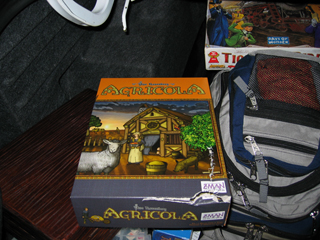I'm not a huge movie snob. I'll watch just about any kind of movie. (Even those "romantical" ones that I give my wife such a hard time about liking—some aren't too bad.) There are some movies that look like a stinker from a mile away. There are some real stinkers that I honestly don't hate, though the general consensus is that it is supposed to be a bad movie. (i.e. Ultraviolet, Battlefield Earth, Star Wars: Episodes I - III, Odd Numbered Star Trek Films) There are movies that I really wanted to see, that turned out to be awful. (i.e. The X-Files: I Want to Believe, Cat in the Hat) Then there are some honestly well done movies that everyone is supposed to like, that I hate. (i.e. Fargo, Million Dollar Baby)
The category that Mamma Mia! fell into was: There is no way in a Million years I would ever want to see that stinker of a movie for any reason (though secretly curious because I grew up in a house where the songs of ABBA flowed freely).
It was on sale at Christmas, and though we had not seen it, I got it and gave it to my wife. Having not seen it, we wisely chose to get it at Red Box first.
Since I was only secretly curious about it I ended up only seeing part of the movie. We started watching it and then went to bed because it was late (see? already it was not good enough to pull us in and force completion upon us—which has been known to happen) and she finished it and took it back without me the next day. I was not heartbroken in the least, because there were problems in this movie from the beginning.
First of all the time period. I don't know when this is supposed to be taking place. Lets look to the movie for clues. The Daughter, reading from Mom's journal indicates that she was conceived during the "Summer of Love" which was 1967, but let's be generous and give them until 70. The daughter is 20 at the most, making this 1987-90. The fashion sense of the film just doesn't fit, it's too modern. Now the Mom was supposedly young when she conceived this daughter of hers; Mom should be at most 40, but probably younger. Meryl Streep could Barely Pass for 40 when she was 40. To me Meryl Streep seemed old when she was young—and here she's trying to play a "40" year old woman tired from being a single Mom for the last 20 years. She turns 50 this year and looks 60 in this move.
She get's with her old "Band Mates" from back in the day. who both look older than her, and the three of them act ridiculous, which I know happens with women when they get together, regardless of age, and I buy it coming from her "band mates"—but from Meryl Streep, not at all—this just feels like bad casting to me. In fact, I can honestly say I liked every pat of the movie (that I saw) which did not have Meryl Streep in it. I have never had a movie ruined for me because of an actor/actress. I think this could have been a good movie with someone else cast in that part, but as is, it's not enjoyable—it's down right uncomfortable.
The stinker of a movie went back to the store, and was enthusiastically replaced with three cheap bin movies:
An Ideal Husband—Brilliant, Funny, Theatrical....Romantical, Comedy.
Bride & Prejudice—Bollywood in Spirit, Funny, (especially if you are familiar with Pride & Prejudice, which I am, thanks to my wife)...Romantical, Comedy.
and Chocolat, to replace the one that was borrowed and never came back—Funny, Intelligent...Romantical, Comedic, Dramatic.
See, I'm no film snob, but Mamma Mia!?....Mamma Mia Indeed!
